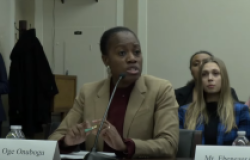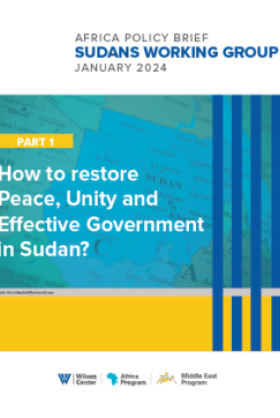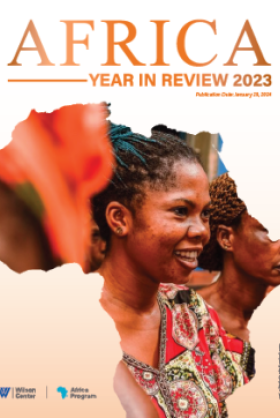Women, Muslim Laws and Human Rights in Nigeria
Professor Osirim: What is the meaning of Shari'a law? How can we understand its implementation in different contexts, given the diversity in the practice of Islam in Africa and around the globe? What are the elements of Shari'a that are particularly relevant to the position of women and gender relations in the African nation(s) under consideration?
Dr. Imam: The word Sharia simply means law in Arabic. The root word means ‘ the way'. These laws are commonly held to be divine laws. However, they are not divine but merely religious, being based on human—mostly male—interpretations of divine revelation. For the most part the laws themselves are not directly outlined in the Qu'ran. For example the prescription of stoning as a punishment for adultery, is not mentioned in the Qu'ran. It is important to note that even the oldest schools of Sharia (Muslim jurisprudence and laws) did not exist until many decades after the Qu'ranic revelations and the Prophet's death. This demonstrates that they are not divine directives handed down directly from Allah, but products of human judicial reasoning and interpretation or ijtihad in Arabic.
Furthermore, Muslim laws are not uniform. There is more than one school of Sharia. The four main Sunni schools that exist today were formed through the personal allegiance of legal scholars or jurists to the founders from whom each school took its name - Hanafi, Maliki, Shafi and Hanbali. Each school had its own specific circumstances of origin. For instance, both Hanafis and Malikis are the representatives of the legal tradition of a particular geographical locality – the former in Kufra, present-day Iraq, and the latter in the Arabian city of Medina. The two later schools, following Abu Hanifa and Al-Shafi developed precisely out of a controversy in jurisprudence (i.e. human reasoning over law). Consequently, each school has variations according to the cultural, political and socio-economic contexts in which they were developed and the philosophy of reasoning that was accepted. There are also Shia schools of law of which the most prominent is the Ithnar Azari.
It is often said that the differences between the schools are minor, but in fact there can be wide diversity – including around women's rights. For instance, neither women nor men require marriage guardians in Hanafi law – a huge difference from the Maliki school where fathers have the right to determine the husband of never-married daughters. In Maliki law women have a right to divorce on demand, which will be upheld by courts in Nigeria, regardless of husband's consent – this is not so in other schools of Muslim laws. Only in the dominant view of the Maliki school is pregnancy outside marriage accepted as evidence of zina (unlawful sexual intercourse). While the majority of Muslim jurists accept contraceptive use and abortion up to 40 days, a minority do not. Even within given schools of Muslim laws there may be divergences about women's rights and capacity to act as witness, judge or leader, with some saying accepting women's capacity in all three, and others more restrictive. These and other diversities are certainly not minor, but have profound implications for women's lives and choices.
Within schools themselves there also can be variations, for instance. not all Maliki adherents view pregnancy as sufficient evidence of zina. I will give just one example here - the issue of polygyny (i.e. the marriage of a man to more than one wife). The Qu'ran permits polygyny. It does not require it. It specifies certain conditions that should be fulfilled if polygyny is to occur. Furthermore, it is also known that the surahs on polygyny were revealed after the battle of Uhud when many Muslim men were killed, at a time when few women had independent access to resources. None of the foregoing statements are contentious. Yet, Muslim thinking and Sharia on polygyny vary tremendously.
Yusuf Ali and others have argued that the conditions are impossible to fulfill, and therefore that polygyny should be banned. Others have argued that on the basis on surah 24:32, monogamy is clearly preferred. Hence in Tunisia and South Yemen (before re-unification with North Yemen), polygyny was banned or allowed only on very stringent conditions, which had to be validated by a court. At the other end of the spectrum, there is emphasis on the permission to marry polygynously. In Nigeria, for instance, not only is there fierce insistence that polygyny is allowed by immutable law, but men often go further to say that they must marry polygynously in order to be like the Prophet. Unfortunately, they do not seem to be interested in following the example of the Prophet's first marriage, to Khadija (the first Muslim), which was to a widow several years his senior, and which was monogamous and ended only with her death.
Sharia evolves over time and is contextual. It cannot, therefore, be considered divine and immutable. Hussein points out that the Qu'ran permits lex talionis - the retribution of an eye for an eye (surahs 2:178, 5:45, 16:126) but the laws of current Muslim states - even in conservative states like Saudi Arabia or theological Islamist states like Iran - do not allow citizens to take the law into their own hands. This he says is because lex talionis is only appropriate for societies without a centralised state. This is a clear example of Sharia being developed to fit the present context - even where the Qu'ran permits an act. Similarly, slavery is banned in Muslim states, although the Qu'ran, like the Bible and the Torah, permits it.
Muslim laws are therefore not unchangeable law, to be accepted unquestioningly by all Muslims. In fact, the scholars after whom the four currently accepted schools of Sunni Sharia were named, had no intention of making their views final and binding on all Muslims. Imam Hanbal urged "do not imitate me, or Malik, or al-Shafi, or al-Thawri and derive directly from where they themselves derived". Imam Malik, the founder of the school of fiqh accepted in Nigeria, cautioned that "I am but a human being. I may be wrong and I may be right. So first examine what I say. If it complies with the Book and the Sunnah, then you may accept it. But if it does not comply with them, then you should reject it." So in the views of the very founders of the schools of Sharia, good Muslims were precisely those who questioned and examined and trusted their own reasoning and beliefs. Furthermore, the founders also found it acceptable that the reasoning of one legal tradition might be considered correct on one issue, but that of another more correct on a different issue.
The irony is that the "West" (most media and politicians, but also many academics and often human rights groups too) go along with Muslim religious extremists and essentialist identity politicians – they seem to be in collusion to delegitimize progressive Muslim scholars and rights activists. They are all guilty of persisting in describing Muslim laws as if they were uniform, directly divinely revealed, necessarily misogynistic and incapable of change and reform. In so doing, the ‘West' supports the Muslim right wing's claims to speak the Truth for the Muslim world against progressive scholars and rights activists of Muslim communities who point out that Muslim laws (like other laws – including Christian-influenced, secular or customar y laws) are historically specific, and influenced by the dominant power relations of culture and gender, and that they have in the past and may in the future be developed to protect rights.
Professor Osirim: What does the implementation of Shari'a law mean for women's human rights and legal status in Nigeria? Do women have representation in Islamic courts? Do women and men have equal rights in this regard?
Dr. Imam: To answer your specific questions, both women and men have the right to representation (legal if they wish) in court and to appear in court. However, as with the secular and customary law courts, very few people actually have legal representation in the lower courts. Poverty, the high cost of legal representation, minimal provision of legal aid, lack of knowledge, and intimidation of the whole court process are contributing factors.
More generally, I want to clarify that the issue is not the implementation of what are called religious laws as such. Laws may be influenced by religious beliefs without being termed religious laws. Here in the USA, the Bush administration's support of the ban on so-called ‘partial birth' abortions is based on Christian right religious views, even if it is not called Christian religious law. The issue is really whether laws – whether termed religious or not – recognize and protect rights. In the context of a discussion of Sharia, this becomes then whose version of sharia is being implemented, because, as I pointed out in the discussion on polygyny, sometimes sharia provisions have been constructed to support male dominance while in other times or places sharia may respect and protect women's rights.
To add yet another layer to an already complex problem is that much recent codification of Muslim laws has been a political game. People become victims of identity politicking and are forced into positions where they feel they need to prove their piety, with a specific focus on morality. Ironically this attention to morality has not included prosecutions on serious embezzlement and corruption or legislation to govern or prohibit interest and loan sharking, or to institutionalize zakat (the charity tithe meant to provide for the poor). Instead what are being emphasized are issues involving personal rights and the control of sexuality. The most conservative and restrictive stances are taken on these issues – such as denying the existence of liberal interpretations on reproductive and sexual rights. Dominantly, Muslim jurists accept contraception and abortion up to 40 days – but the Muslim religious right in Nigeria attempt to deny even knowledge about contraceptive techniques on grounds it is prohibited and promotes immorality. The result of this is that women's interests and rights are ignored or sacrificed in the attempt to appease the religious right and their upholding of male dominance.
These attitudes flourish primarily among those who have been disenfranchised of their economic and social rights; those who do not have access to education, food, jobs or adequate health care—the most basic services. The failures of development planning, the effects of the structural adjustment programs of international financial institutions like the IMF and the World Bank, and increasingly the decisions of the WTO have directly impacted on the poor. Amongst the results of this increasing impoverishment in the last few decades have been an increasing religiosity with a turn to religion for certainty in uncertain world, dependence on religious right groups to provide services that the state no longer provides, so that the religious groups then have a hold upon the citizenry, including coercing them to comply.
But there are also ideational issues that enable the rise of a religious right support. People are disillusioned with and cynical about governments. They are victims of corruption and have consequently lost faith in their leaders and politicians' promises of socialism, capitalism, modernization, nationalism... Along with the poor, many young middle class men (especially) and women turn to religion as a means of asserting their religious and/or cultural identity in the face of increasing globalization and western cultural domination. This especially affects diasporan Muslims who must face directly both racist prejudice and institutionalized racism in their daily lives.
Clearly, these tendencies are worldwide with a growth in the strength of the religious right of many religions and regions, including the Christian Right in the USA and Europe, the Hindu Right in India, the Jewish Right in Israel and the USA, as well as the Muslim Right in Nigeria and elsewhere.
The way to combat this rise of the religious right is to devise national and international policies that both give material hope for just development and sharing of material resources as well as cultural and political respect for diversity and recognition of others' interests.
Professor Osirim: What does the implementation of Shari'a law in Nigeria mean for women's position and contributions to development in that nation?
Dr. Imam: Since before Independence in 1960, Nigeria has always had three systems of law in the realm of family and personal status (concerning marriage, divorce, child custody, inheritance and the like). These were general (sometimes referred to as secular or civil law), Muslim laws, and customary laws. In the Sharia courts over the past twenty to thirty years, the Sharia courts have increasingly recognized and upheld women's rights to inherit (especially to inherit land), to divorce on demand (often without, or with only token payments), to custody of their children, to being able to hold their children's property in trust, against forced marriages, and so on.
So, perhaps the question is really, what are the implications for women's rights of this new conservative religious extremism and the Sharia Criminal Codes passed since 1999 in 12 of Nigeria's 36 states.
Generally the new criminal laws concern what are called the hudud offences (i.e. those offences for which specific punishments are mentioned in Qu'ran – although the Sharia Penal Codes also include punishments not mentioned in the Qu'ran, like stoning to death. They also include amputations for theft and whipping for zina, alcohol consumption, false witness and other offences. Other sanctions introduced by the act include retaliatory punishment (qisas) and monetary compensation (diya).
The provisions of the Penal Codes are generally gender-neutral. However there are some exceptions – with the exceptions generally being in favour of men. As in the 1960 (‘secular') Penal Code, the Sharia Penal Codes continue to permit husbands to beat wives. Nor do they recognise marital rape (which is not recognised in general secular law in Nigeria either). Some of the Penal Codes (Niger, Kano, and Birnin Kebbi states) specify that men's testimony will be worth more than that of women. The diya (monetary compensation in cases of hurt, if the victim or his/her family are willing to accept this instead of the stated punishment) to be paid for Muslim men is higher than that of Muslim women (or non-Muslims), although qisas (retaliatory punishment) can be applied regardless of gender. In one instance, men are subject to harsher punishments than women – in Kano State, never married men convicted of zina may not only be lashed but also subject to one year's imprisonment (never-married women would liable for lashing only).
In the Sharia Penal Codes, rape is treated as a form of zina – illicit sexual intercourse. Reporting rape is thus equivalent to confessing to zina. In the most probable situation of lack of two witnesses or a confession from the rapist, rape would be hard to prove, and so women would find themselves not only subject to zina punishments, but also liable for false witness in addition. Thus, the new Sharia Penal Codes deprive women of protection from rape and sexual assaults.
The Sharia acts also include general provisions that other issues of "Islamic law' even if not mentioned shall be law. It is possible that this might include the revival of issues such as ijbar (a fathers' right to arrange first marriages of ‘virgin' daughters – which the Sharia courts have been finding ways of discouraging over the past few decades).
There are also local bye-laws that discriminate against women. In Gusau, Zamfara state, there is a local government bye-law that prohibits Muslim women from using achaba (motorcycle taxis – the cheapest and most convenient form of public transport available in Gusau). In Kano state women have been banned from participation in sports and public recreation.
Quite apart from the texts of the laws, there has been discriminatory implementation and improper procedures that vitiate women's rights in particular. By postulating that pregnancy outside marriage is evidence of zina (a minority position in Sharia which is not held by the Hanafi, Hanbali and Shafi schools, nor a variant of the Maliki school), women have been held to a different standard of evidence than have men 1. Non-married women are required to provide evidence to prove their innocence, but men are not. If the prosecution does not provide independent evidence, such as four eye-witnesses, men can simply walk away, unlike women. And yet, the Qu'ran specifies that whoever brings an allegation of zina without four witnesses, be they male or female, will themselves be guilty of bearing false witness and subject to punishment. More women than men have been both charged and convicted of zina. Women who ought not to even have been charged, have been convicted of zina and sentenced to death, by ignoring the well-established Maliki doctrine of the "sleeping embryo" (kwantace in Hausa), whereby a child born to a woman within a set period after the end of her marriage (in some areas up to seven years), is assumed to be the child of that marriage. Women have also been accused and convicted of zina as prostitutes, for instance, with neither confession nor the testimony of four witnesses to a willing act of sexual intercourse, nor even pregnancy, for evidence.
Furthermore, the principle of shubha – which indicates that if there is any doubt, a conviction should not be made—has been totally ignored when it comes to women, even when the victim alleged coercion.
The political pressure for convictions has resulted in throwing up obstructions to the legal procedure. In the Bariya case this included: refusal to accept application for appeal (i.e. physical refusal to take the papers), refusal and delays in obtaining copies of court judgements and deliberate delays and obfuscations, as well as bringing forward the implementation of her sentence (thankfully whipping not stoning) in order to circumvent the appeal and defy international and national protests.
Procedural problems are also a result of the lack of knowledge of lower court personnel, including judges. Judges' notions of what is proper behaviour and overarching attitudes towards gender relations colour the way in which they receive and treat pleas from women as opposed to those from men. For example if Sharia court judges (so far all male) believe in men's right to marry young girls and or have themselves chosen their daughters' husbands, they are unlikely to be sympathetic to a young girl's rights or her misery in a forced marriage.
Less well-known are the effects that these new laws are having on other non-married women and/or commercial sex workers who are frequently harassed, evicted, forced to leave their states of residence and/or charged and convicted with zina and ‘immoral behaviour' (usually in the absence of either witnesses or confessions). In addition, the mode of implementation of these laws are worsening the likely incidence of forced sex, sexual assault and rape possibilities, by requiring two male witnesses for such offences and threatening prosecutions for false witness if accused men are not convicted. This obviously violates women's rights to choose safe sexual encounters, health and personal safety.
While the passing of the first Sharia Act in Zamfara State in November 1999, was clearly political opportunism, it sanctioned and encouraged both the growth and the expression of extremely conservative Islamism in much of northern Nigeria, often claiming to implement ‘Sharia' by extra-legal means. In addition, there are a host of practices, with no legal basis at all, which are being imposed on society in the name of 'sharianization'. These include the widespread imposition of dress codes on women, attempts to force women to sit at the back of public vehicles, and a midnight curfew in Gusau. Many of these are enforced by extra legal groups of young men vigilantes - sometimes openly supported by the state government as in Zamfara, but sometimes with attempts to control and stop them from taking the law into their own hands, as in Kano state
This is having serious consequences for women's reproductive rights. For instance, sex education is being removed from school curricula. Attempts have been made to prevent non-governmental organizations from running sexuality education workshops (on family planning and reproductive health care, for example). The father's right to control the marriage of a never-married daughter (ijbar) is being re-asserted, and child marriage is being advocated again.
In addition, there have been criticisms, abuse, verbal attacks and physical threats to women's rights activists – measures meant to intimidate, and which, if successful, would further hinder the implementation and advocacy of women's rights issues.
Professor Osirim: What has been the position of the national government with respect to this law? How does a government reconcile its actions or inactions with its obligations under international human rights law?
Dr. Imam: President Obasanjo's attitude has been one of hoping that the problem will go away by itself, without the federal government's intervention.
The legal situation is complicated. In Nigeria international treaties have to be domesticated (enacted internally) before they become part of Nigerian law. So, there is the ironic situation that having (for instance) signed and ratified CEDAW (the Convention to End All Forms of Discrimination Against Women), the Nigerian state is obliged to report on its implementation of CEDAW to the UN under international law, but Nigerian women cannot enforce their rights under CEDAW through the courts in Nigeria. (Although, some judges have begun mentioning CEDAW in their judgments, so that it is entering Nigerian law by way of case precedent.) The only human rights treaty that has been domesticated is the Africa Charter, so technically this is the only international (because now national) human rights treaty that Nigerians may certainly make claims on through the courts.
Secondly, the principle of locus standi is very narrowly interpreted in Nigeria, so that only those who are the direct victims (or their guardians if they are children or otherwise legally incapacitated) can bring cases in court. So women' s and other human rights organisations cannot bring class actions to challenge either specific laws, or policies, or instances of rights violations. Unless those convicted under the Sharia Penal Codes are willing to appeal then cases cannot be brought. Until recently, most victims would not appeal. Those who have appealed – so far all successfully -- have chosen (as have their counsel and supporting women's and human rights NGOs) to use Muslim and Nigerian constitutional grounds, rather than claiming rights under inter national human rights treaties. They have also chosen not to challenge the constitutionality of the Sharia Acts themselves (see Imam forthcoming as to reasons why this is so).
The constitutionality of the various Sharia Acts is ambiguous. Nigeria has always had ‘general', customary and Muslim laws – all three systems of laws administered through state controlled and maintained courts and police. It is hard to argue therefore that Muslim laws per se have suddenly become unconstitutional. The Muslim Right argue that since the Sharia Acts apply only to Muslims that they are not equivalent to adopting a state religion (which would be contrary to s. 10 of the Constitution), since non-Muslims continue to have general or customary laws available to them, as they chose. (It should be noted however that there are also sections of the Muslim Right who have declared the intention that the Sharia Acts should apply to all within their state boundaries, regardless of religious affiliation.) They argue further that since the Constitution guarantees the right to practise one's religion, that this permits Sharia laws in criminal as in personal status issues. Opponents argue in return that Muslim personal status laws are sufficient to enable the practise of one's religion, without extending it to criminal and other civil matters.
The Constitution provides for the existence of parallel systems of general, customary and Sharia courts of appeal (all terminating in the Supreme Court). However the jurisdiction of the Sharia Courts is set out as personal status law. Hence it has been argued that the Constitution does not permit Sharia in Nigeria to include criminal offences. However, criminal law is not on the federal exclusive list in the constitution. In terms of federal vs. state authority this means that the states have residual powers to legislate criminal offences – including possibly Muslim criminal laws. It is clear however, that evidence is on the federal exclusive list and several of the Sharia Penal Codes do make reference to evidence requirements. Challenging the Sharia Penal Codes on these grounds however would not be helpful for rights protection, since the federal evidence requirements are broader than those in the Penal Codes (which permit only witnesses and confessions) and thus it would make prosecutions more likely to succeed and not less, if federal evidence legislation was adduced.
Prior to this no one has raised the issue of whether or not Muslims can choose secular or customary laws, rather than customary laws. In practice some Muslims have married under the Marriage Act, rather than under Sharia or disposed of property wholly by will, rather than a maximum of 1/3 by will and the rest to stipulated heirs as in Sharia (see the case of Chief Abiola, for instance). However, given the dominance of the Muslim right now, it seems that this is less and less likely to be possible in future, thus affecting the Muslims' rights to freedom of religious expression and from religious law (constitution) or that there shall be no compulsion in religion (Qu'ranic assurance).
Nonetheless, regarding the passivity of the federal government, there are measures that might have been taken. It is important to note the difficulty a ‘born-again' Christian President faces in dealing with Muslim laws, with the high probability that any intervention that appears like a veto would be met with riots, with deaths, injuries and property destruction resulting – as has happened in a number of cases. Nonetheless, much could have been tried earlier on, before attitudes hardened. For instance, the President might have asked the Supreme Court for a ruling on the constitutionality of the contents of the Penal Codes, in his constitutional authority as protector of the constitution. The President might also – and still could – present the international human rights treaties that Nigeria has ratified to the federal legislature for debate and domestication. The President's office could also support a bill to permit the National Human Rights Commission to bring cases on human rights issues (if not also permitting class actions in general).
Professor Osirim: Does the co-existence of multiple legal systems - customary, statutory, and Sharia law pose particular threats to the stability of democracy in nations, such as Nigeria?
Dr. Imam: The issue of stability is a political problem not a legal one. The Ottoman Empire through its centuries' long history had precisely separate laws for peoples of different faiths. Throughout its colonial and post-colonial history Nigeria has had multiple and parallel legal systems, all of them administered through and implemented by state legal and judicial institutions, with family and personal status issues most often settled in Muslim or various customary laws. Thus Nigeria has always had different laws for different communities according to religion, faith and ethnicity. The issue is not the multiple legal systems, but the possibility of democratic choice by citizens as to the contents and modalities of those laws, rather than their imposition – whether of a single system or of multiple systems.
Professor Osirim: Ultimately, what does this all mean for women's equality? The major news stories in the US media about women who have been convicted of violating Shari'a law have focused on women from poor and low-income backgrounds. Is this the population most significantly affected?
Dr. Imam: Those who have been charged under the new Sharia Penal Codes have been predominantly poor, often rural but also the urban poor, not-literate women, men, and children. It is clear that women more often than men are prosecuted for zina, despite the fact that adultery, fornication and "immoral gatherings" require (at least) two people – one of each sex. Although both women and men have been found guilty of fornication and consequently whipped (and/or imprisoned, if men), only women have been convicted of adultery, with its higher penalty of stoning to death. In cases of alcohol consumption, theft and sodomy, men more often than women are prosecuted – so far only men and boys have been tried and convicted of theft and sentenced to amputation. In general it is the poor and not the wealthy and powerful who have faced criminal prosecutions.
However, there are also the indirect effects of the new Penal Codes and the strengthening of the voice of the religious right which are much more widespread. Attempts to impose dress codes and attacks on women outside of their homes have been common – and the fear of attacks with consequent ‘self-imposition' of dress codes or curtailing of activities and travel outside the home (or their imposition by concerned parents, husbands and other relatives or affinities) makes their influence wider yet. The hindering of sexuality education and access to fertility management particularly affects girls and young women and men, as well as the poor more generally. Invading private homes to stop music and dancing (even in single-sex celebrations) is not uncommon. The climate of fear and intimidation cultivated by the religious right – accusing all who criticise, however mildly, of apostasy and being anti-Islam, and threatening violence against them – is also pervasive, and not limited to any one sector of society.
However, that these are results of the invocation of religion for political ends is becoming increasingly clear. Consequently, there is increasing resistance to these practices and therefore, more fighting for rights. Examples of resistance including fellow villagers trying to hide women accused of zina from investigators, as well as village heads warning off local vigilante groups from trying anything in their areas. There is an increased willingness of those charged to appeal convictions, as well an increased willingness of northern and Muslim citizens and NGOs to support these appeals. More and more women are publicly complaining about dress codes and movement restrictions and other religious right attempts to control women and women's sexuality. Indeed more and more women, especially, have been participating in workshops that analyse women's rights in law and the historically specific, gender, class and culture orientations that are implicit in given laws – including Muslim laws, with a view to using that knowledge for legal rights advocacy and development. That is where hope for the future lies.
Related Program

Africa Program
The Africa Program works to address the most critical issues facing Africa and US-Africa relations, build mutually beneficial US-Africa relations, and enhance knowledge and understanding about Africa in the United States. The Program achieves its mission through in-depth research and analyses, public discussion, working groups, and briefings that bring together policymakers, practitioners, and subject matter experts to analyze and offer practical options for tackling key challenges in Africa and in US-Africa relations. Read more










